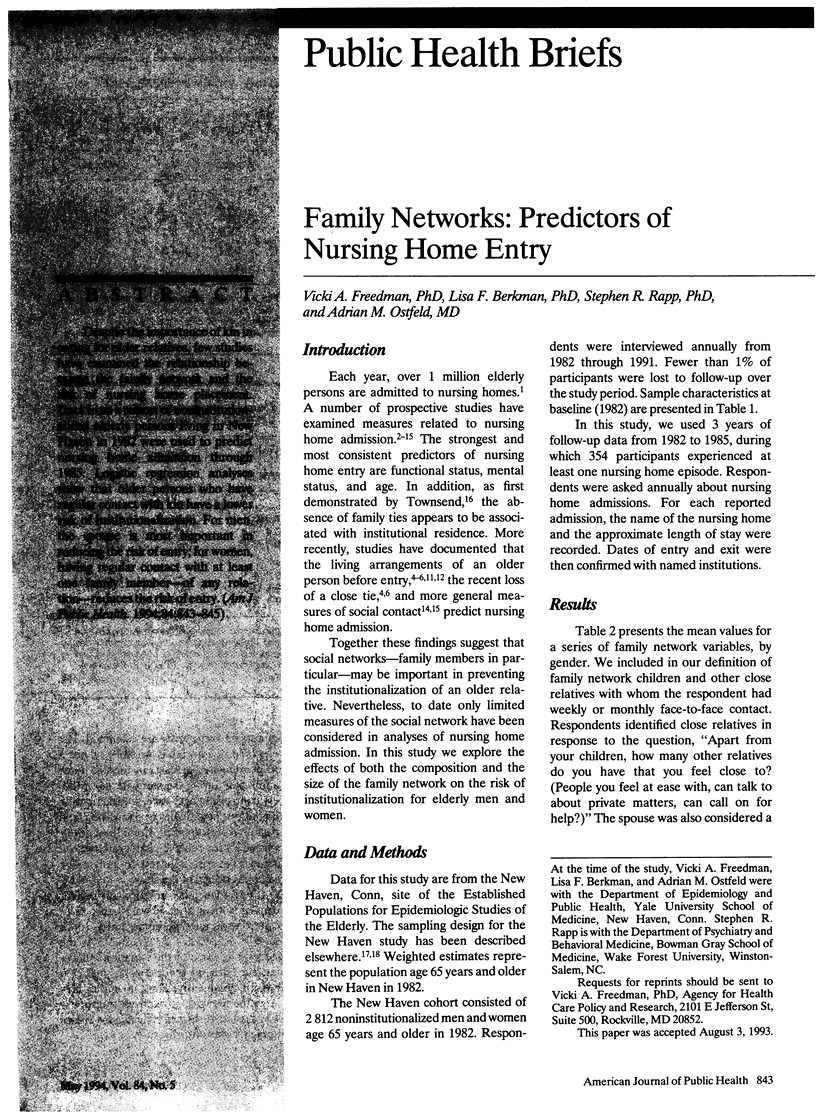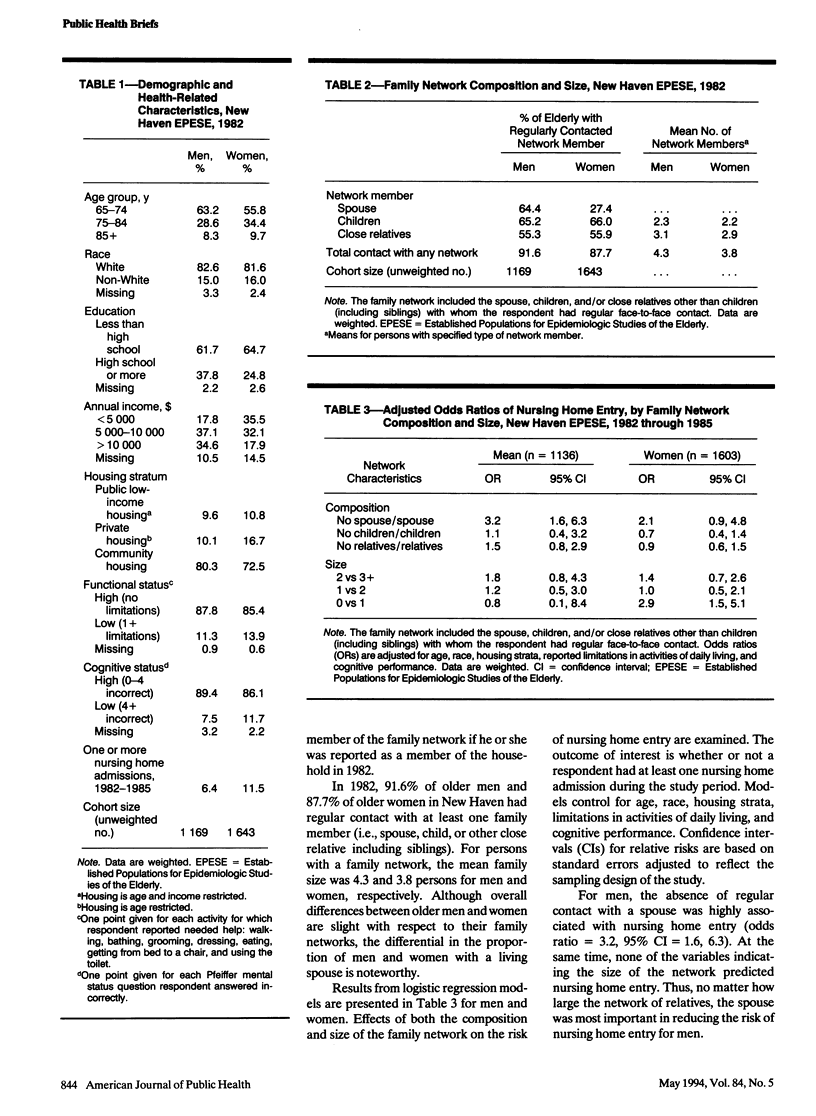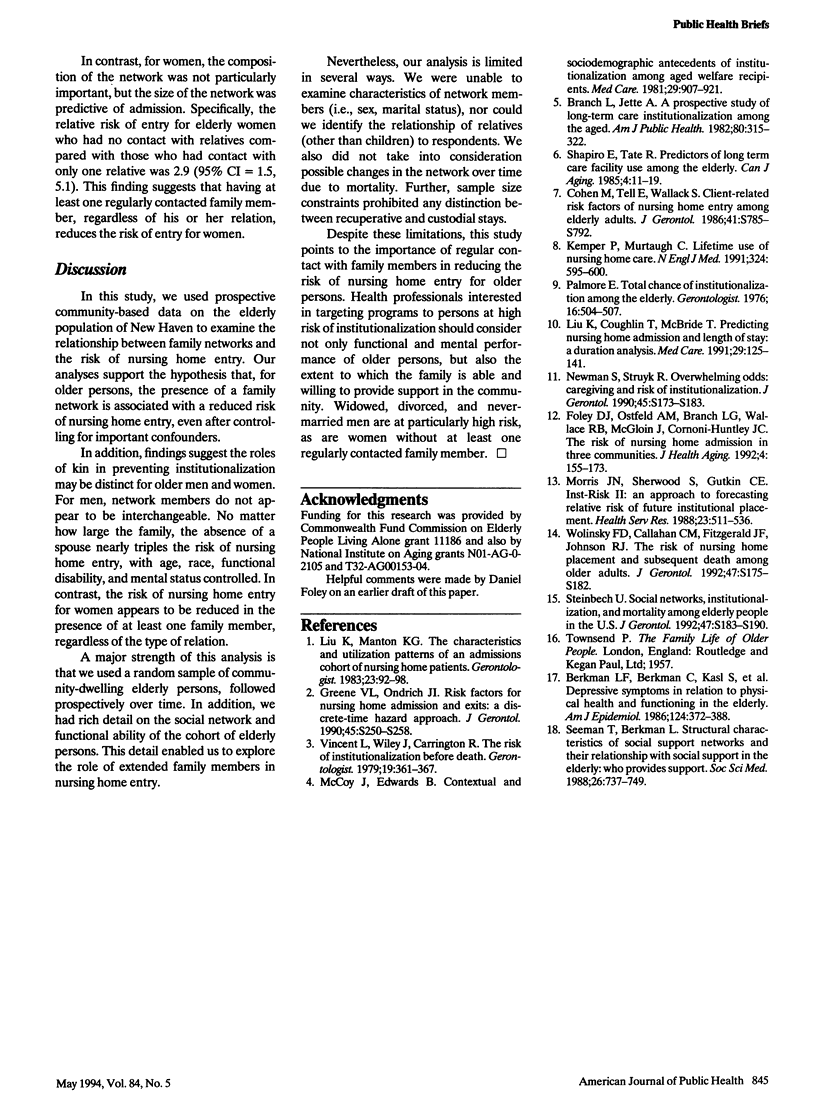Abstract
Despite the importance of kin in caring for older relatives, few studies have examined the relationship between the family network and the risk of nursing home placement. Data from a cohort of noninstitutionalized elderly persons living in New Haven in 1982 were used to predict nursing home admission through 1985. Logistic regression analyses show that older persons who have regular contact with kin have a lower risk of institutionalization. For men, the spouse is most important in reducing the risk of entry; for women, having regular contact with at least one family member--of any relation--reduces the risk of entry.
Full text
PDF


Selected References
These references are in PubMed. This may not be the complete list of references from this article.
- Berkman L. F., Berkman C. S., Kasl S., Freeman D. H., Jr, Leo L., Ostfeld A. M., Cornoni-Huntley J., Brody J. A. Depressive symptoms in relation to physical health and functioning in the elderly. Am J Epidemiol. 1986 Sep;124(3):372–388. doi: 10.1093/oxfordjournals.aje.a114408. [DOI] [PubMed] [Google Scholar]
- Foley D. J., Ostfeld A. M., Branch L. G., Wallace R. B., McGloin J., Cornoni-Huntley J. C. The risk of nursing home admission in three communities. J Aging Health. 1992 May;4(2):155–173. doi: 10.1177/089826439200400201. [DOI] [PubMed] [Google Scholar]
- Greene V. L., Ondrich J. I. Risk factors for nursing home admissions and exits: a discrete-time hazard function approach. J Gerontol. 1990 Nov;45(6):S250–S258. doi: 10.1093/geronj/45.6.s250. [DOI] [PubMed] [Google Scholar]
- Kemper P., Murtaugh C. M. Lifetime use of nursing home care. N Engl J Med. 1991 Feb 28;324(9):595–600. doi: 10.1056/NEJM199102283240905. [DOI] [PubMed] [Google Scholar]
- Liu K., Coughlin T., McBride T. Predicting nursing-home admission and length of stay. A duration analysis. Med Care. 1991 Feb;29(2):125–141. doi: 10.1097/00005650-199102000-00005. [DOI] [PubMed] [Google Scholar]
- Liu K., Manton K. G. The characteristics and utilization pattern of an admission cohort of nursing home patients. Gerontologist. 1983 Feb;23(1):92–98. doi: 10.1093/geront/23.1.92. [DOI] [PubMed] [Google Scholar]
- McCoy J. L., Edwards B. E. Contextual and sociodemographic antecedents of institutionalization among aged welfare recipients. Med Care. 1981 Sep;19(9):907–921. doi: 10.1097/00005650-198109000-00003. [DOI] [PubMed] [Google Scholar]
- Morris J. N., Sherwood S., Gutkin C. E. Inst-Risk II: an approach to forecasting relative risk of future institutional placement. Health Serv Res. 1988 Oct;23(4):511–536. [PMC free article] [PubMed] [Google Scholar]
- Newman S. J., Struyk R., Wright P., Rice M. Overwhelming odds: caregiving and the risk of institutionalization. J Gerontol. 1990 Sep;45(5):S173–S183. doi: 10.1093/geronj/45.5.s173. [DOI] [PubMed] [Google Scholar]
- Palmore E. Total chance of institutionalization among the aged. Gerontologist. 1976 Dec;16(6):504–507. doi: 10.1093/geront/16.6.504. [DOI] [PubMed] [Google Scholar]
- Seeman T. E., Berkman L. F. Structural characteristics of social networks and their relationship with social support in the elderly: who provides support. Soc Sci Med. 1988;26(7):737–749. doi: 10.1016/0277-9536(88)90065-2. [DOI] [PubMed] [Google Scholar]
- Vicente L., Wiley J. A., Carrington R. A. The risk of institutionalization before death. Gerontologist. 1979 Aug;19(4):361–367. doi: 10.1093/geront/19.4.361. [DOI] [PubMed] [Google Scholar]
- Wolinsky F. D., Callahan C. M., Fitzgerald J. F., Johnson R. J. The risk of nursing home placement and subsequent death among older adults. J Gerontol. 1992 Jul;47(4):S173–S182. doi: 10.1093/geronj/47.4.s173. [DOI] [PubMed] [Google Scholar]


